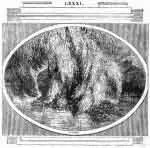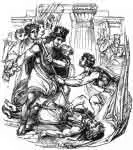A Willow asked the Lake why it, on one day be placid and reflect all things but on another day be roiled and an instrument of mischief. No answer.
Do as few things as possible that you might have to repent.

Northcote
A Willow that grew on the border of a beautiful Lake, once on a serene summer’s morning, thus addressed his fickle neighbour. “My good friend,” said he, “how fair and placid you look to day; there is not a wrinkle on your face! Why should you who possess such high and polished transparency, who with such exactness of discrimination can represent the greatest beauties, as well as distinguish the defects of every object that presents itself to your view, even from the starry firmament to the meanest crawling earth-worm.—Why, I repeat, should you be so hastily disturbed by every passing gale, and suffer your calm bosom to be at times so agitated and overcome by rage, as totally to lose all your beauty, and with it all your powers of reflection, stirring up every foul particle within you, and thus exposing yourself a spectacle of pity, and becoming an instrument of wild mischief and destruction, insulting and bespattering your nearest friends and neighbours?”
Application
Nothing should be curbed with more care than unruly passion, as nothing more exposes a man’s weak side, and throws him into the way of every danger: during the time it lasts he becomes the slave of every evil, and however amiable before, he then is odious. It behoves us, as reasonable creatures, to conduct ourselves discreetly, and to do as few things as possible of which we may have occasion to repent.
No man can guess in cold blood, what he may do in a passion. And while the heart is ruffled by the remains of a former passion, it is more susceptible of a new one than if it was entirely settled.
There is in all passions a kind of intoxication or madness, which makes them very dangerous to be followed, and we ought not to trust them, even when they appear most fair and reasonable to ourselves. J. N.

